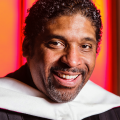Got something to say about what you're reading? We value your feedback!
We Must Go Beyond Trump and Reconstruct Our Democracy

Oct 30, 2018
Since the inauguration of President Trump, millions of Americans have marched and rallied to protest an administration whose policies have targeted Muslims, undocumented immigrants, anti-poverty programs, women’s rights and the LGBTQ community while also giving massive tax breaks to wealthy Americans, loosening corporate regulations, and remaking the federal courts through extreme judicial appointments. This administration’s use of policy as a weapon against whole classes of people has elicited a wave of nonviolent direct action unlike anything America has experienced since the civil rights movement.
But the collective moral outrage which many label “The Resistance” must move beyond the villain to a common vision for reconstructing democracy in America this November. Over the past two years, Trump has been tremendously successful at making sure our 24-hour news cycle stays focused on him. But Trump is not the problem with our democracy. He is only a symptom of a deeper moral malady that keeps us from telling the truth about how the moral concerns of everyday Americans have been drowned out of our political debates for decades. As America prepares for the upcoming midterm elections, we must be clear that this is a referendum on truth, not Trump.
In the richest nation in the history of the world, 140 million Americans are poor or low income — one emergency away from not being able to meet their basic needs. We cannot be distracted by arguments about which president or party in recent history had more quarters with over 4 percent economic growth while Congress seriously considers cuts to programs like the Supplemental Nutrition Assistance Program (SNAP) and the Children’s Health Insurance Program (CHIP). Donald Trump is not on the ballot this November, but the fate of poor people in America certainly is. In state legislature and congressional races, we must ask ourselves which candidates are willing to challenge the lies that keep millions of our neighbors in poverty.
As preachers who teach the moral concerns of Scripture, we know that Jesus and the prophets of the Bible are overwhelming concerned with how policy decisions impact the most vulnerable in society — women and children, immigrants, people who are sick, and the poor. In the same manner, our Constitution makes clear that a “more perfect union” — the America we have never yet been — demands that we address the general welfare and questions of equal justice for all. These are not partisan commitments, but moral values that are rooted deeply in America’s religious and constitutional traditions.
Yet in Congress as well as statehouses across the country, politicians who have voted against expanding healthcare for their constituents are asking voters to support them. In our home state of North Carolina, where millions of people are currently receiving federal emergency relief as we recover from Hurricane Florence, the legislature still refuses to accept federal funds and expand Medicaid under the Affordable Care Act. Half a million North Carolinians who should have had access to healthcare for years still lack coverage, not because of anything President Trump has done, but because of our elected leadership in the North Carolina General Assembly.
Many of the congressional representatives who have voted in lock-step with the Trump administration’s most extreme policies are gerrymandered into districts where a sizable majority will have to turn out in order to reclaim our government to promote the general welfare. But despite voter suppression tactics that governors and state legislators have passed in many Southern and Midwestern states, we have the opportunity to mobilize the single largest segment of the American electorate — a group larger than either party or unaffiliated voters: our neighbors who did not vote in the 2016 election. These forgotten voices have not participated in the democratic process because they have not seen anyone run to represent them.
But 2018’s midterms present us with the opportunity to build a new fusion coalition around issues that matter to the poor and uninsured — issues like living wages, access to healthcare, voting rights, strong public education, just immigration policies, and equal protection under the law for all people, regardless of race, gender, or sexual orientation. These are not the narrow concerns of morality that have been used by culture warriors for decades to pit so-called “values voters” against their more secular neighbors. They are, instead, deeply moral concerns that are shared by the vast majority of Americans from a wide range of religious and cultural background.
These moral concerns are, in short, the basic truth that millions of Americans cling to as we watch our common life battered by obvious lies and the erosion of democratic norms. They offer us a common vision that is far more important than any villain who may oppose them. When we vote this November, we must elect the people who are most committed to working with us to make this vision the policy that defines our life together.







